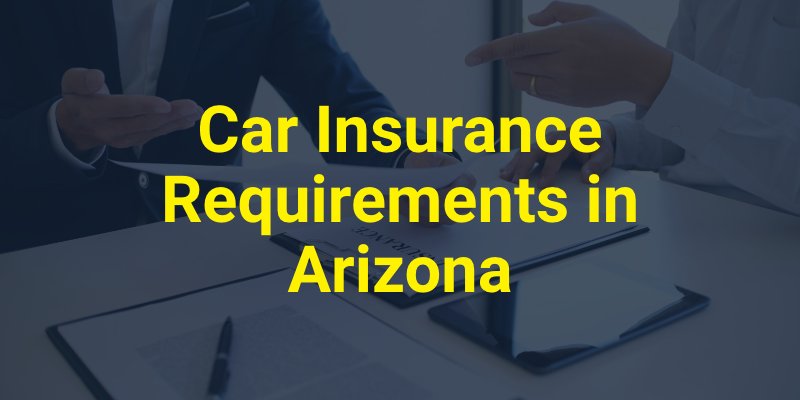Arizona state law mandates that all drivers carry a minimum amount of car insurance. This requirement is designed to ensure that financial resources are available for those involved in an accident. Understanding these requirements ensures legal compliance and also forms an essential part of responsibly navigating Arizona’s roadways.

Arizona operates under a “fault” system for car accidents, meaning that the driver who is found at fault for causing an accident is financially responsible for any resulting harm. This system necessitates that drivers carry liability insurance to cover damages they may cause to others in a collision. Understanding this can be crucial in navigating the aftermath of a traffic incident, as it directly affects how insurance claims are processed and how damages are compensated.
In Arizona, drivers are required to carry a minimum amount of liability insurance, often referred to as 25/50/15 coverage. This includes:
If you’re involved in a crash and have questions about insurance claims, working with a personal injury lawyer is an important first step.
On the surface, Arizona’s minimum insurance numbers might seem sufficient. However, Arizona’s current car insurance requirements are not always up to par when it comes to medical treatment costs, and vehicle repair prices.
In cases of severe injury or fatalities, the state minimums could be quickly reached, leaving you vulnerable to lawsuits and personal liability.
Beyond the state’s minimum requirements, there are additional types of coverage that are highly recommended for any Arizona driver seeking full protection. These include:
This type of coverage helps pay for repairs to your car if you collide with another vehicle or object.
Comprehensive insurance is for non-collision damages that occur from instances of extreme weather, vandalism, and theft.
Arizona’s minimum insurance requirement only covers the other party. Medical payment coverage steps in to cover medical costs for you and your passengers, regardless of fault in an accident.
Carriers are required to include MedPay in their policies, providing a minimum coverage of $3,000. However, this can be waived in writing by the policyholder.
In 2022, nearly 14% of drivers in the United States were uninsured. This coverage can help you out if you’re in an accident with one of them, covering your medical bills and those of your passengers.
Similar to MedPay, uninsured motorist coverage must be offered in Arizona, but you can reject it.
Understanding Arizona’s insurance requirements and options is essential if you’re ever in an accident.
If you find yourself involved in a car accident where the at-fault driver doesn’t have insurance coverage sufficient to cover your losses, it can be an extremely frustrating experience. It’s important to understand your options and rights for recouping damages in these scenarios. Here are some steps you may be able to take:
If you find yourself in a situation where the other driver’s insurance falls short, turning to your own underinsured motorist coverage could be an option. While this coverage is optional, choosing to have it can offer peace of mind and significant financial relief in the aftermath of an accident with an underinsured driver.
Additionally, other types of coverage, such as collision or comprehensive insurance, can also contribute to covering the costs, depending on the specifics of the incident and the terms of your policy.
When involved in an accident where the other party is at fault but lacks sufficient insurance coverage to compensate for your losses, filing a personal injury lawsuit might be a viable option. This legal avenue allows you to pursue damages directly from the at-fault driver.
However, this process can be lengthy and complex, requiring the expertise of an experienced attorney to navigate the legal system and prove negligence on the part of the other driver.
After a car accident, taking proactive measures can greatly enhance your chances of success with any subsequent insurance claim. These critical steps ensure that you protect both your health and legal interests from the very start. The following are steps you can take to increase the likelihood of a successful outcome:
Check for Injuries and Call for Help: Immediately after an accident, assess yourself and others for injuries. Call 911 and request medical assistance and police presence on the scene.
Document the Scene: Take photos and videos of the accident scene, including all vehicles involved, license plates, street signs, and any relevant environmental conditions. This documentation can be crucial for your claim.
Exchange Information: Exchange contact and insurance information with the other driver(s) involved in the accident. Include names, addresses, phone numbers, insurance policy numbers, and vehicle details.
Gather Witness Information: If there are witnesses, get their names and contact information. Witness statements can significantly support your claim. If your car accident case goes to court, your lawyer can reach out and interview them to help corroborate your side of what happened.
Notify Your Insurance Company: Report the accident to your insurance company as soon as possible. Providing them with accurate and detailed information will help process your claim more efficiently. Don’t make any statements about who you believe is at fault or your subjective thoughts about the accident – keep it factual.
Seek Medical Attention: Even if you feel fine, it’s important to see a doctor after an accident. Some injuries may not be immediately apparent, and having a medical record from right after the accident can be crucial to your claim.
Consult with an Attorney: Consider consulting with a personal injury attorney who can advise you on the best course of action and help you decide what steps to take next to give you the best chance of recovering the compensation you deserve.
If you need help after an accident or have questions about insurance requirements in Arizona, don’t hesitate to contact us today to schedule a free consultation.